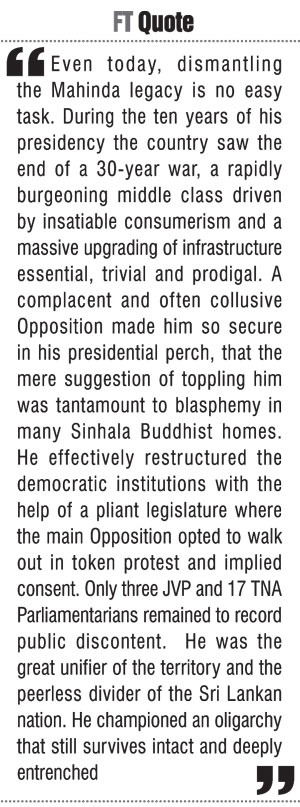Tuesday Feb 17, 2026
Tuesday Feb 17, 2026
Saturday, 12 September 2015 00:00 - - {{hitsCtrl.values.hits}}
''Politics is the conduct of public affairs for private advantage – Devil’s Dictionary''
 Sri Lanka’s new Cabinet of Ministers
Sri Lanka’s new Cabinet of Ministers
The consensual alliance of national unity is now in place. How will it proceed? Will its leaders search for consensus or mould a  consensus? Conceived initially as an experiment that would last for two years, President Maithripala Sirisena has now given it a fresh lease of five years. Its composition has transformed the ‘land like no other’ from Mahinda’s soft autocracy to Maithri’s ‘cartel democracy’.
consensus? Conceived initially as an experiment that would last for two years, President Maithripala Sirisena has now given it a fresh lease of five years. Its composition has transformed the ‘land like no other’ from Mahinda’s soft autocracy to Maithri’s ‘cartel democracy’.
The most venerable Maduluwawe Sobhitha thero, Leader of the National Movement for Social Justice, has scorned its size and composition and stated the obvious – it is a colossal burden on the taxpaying public. He has gone further and described it as a “payoff” and a farce. The so-called ‘National Government’ has perfected the art and even eclipsed the Rajapaksa premise.
The Venerable thero should ask himself the question which ticks the politician. If self-interest does not motivate political participation, then what does?
The Maithri-Ranil-Chandrika troika is engaged in a convoluted strategy of forcing political change through orchestrated crisis, consent and cohesion. The who’s who of Cabinet Ministers, Ministers of State and Deputy Ministers confirm the political principle that was enunciated by David Hume, who is regarded as one of the most preeminent philosophers to write in English. “Avarice, or the desire for gain, is a universal passion which operates at all times, in all places and upon all persons.”
Susantha Punchinilame as Deputy Minister of Public Administration demonstrably emphasises public service values. Lakshman Wasantha Perera as Deputy Minister of Plantation epitomises the distilled essence of our cash crop economy. Portly Nishantha Muthuhettigama as Deputy Minister of Ports and Shipping will surely outperform Guy Fawkes as he has already announced that he will set alight the port of Galle. Nimal Lanza, Deputy Minister of Tourism Promotion and Christian Affairs, and Arundika Fernando, Deputy Minister of Home Affairs, have exchanged their portfolios with the concurrence of President Maithripala Sirisena. That is as it should be. Arundika has the ability to locate missing Lankans in the back alleys of Paris while Mr. Lanza can detox home affairs now in ecstatic confusion.
17 August verdict
That former president Kumaratunga has countenanced the return of the rejected S.B. Dissanayake, who wished to strip and march her in public for her spunk in opposing the Rajapaksa autocracy, to Parliament and Cabinet is evidence of the desperation for interparty collusion to avert the spectre that is haunting the new Parliament – intrigue by an adored autocrat.
The 17 August verdict was not about good governance. It was about Mahinda Rajapaksa. The Movement for Mahinda restoration gathered its momentum due to the failure of the UNP and its leader to grasp the spirit of the Maithri Mandate of 8 January. The Nugegoda rising was the direct outcome of the UNP’s misapprehension of the people’s desire for change.
Wickremesinghe’s cerebral strategies were no match for the tribal instincts of Dinesh Gunawardena and Wimal Weerawansa. The duo with the support of a segment of the Sangha brilliantly succeeded in igniting the Mahinda movement in less than two months of incessant, irrational and communal posturing.
As the acknowledged ‘Pen’ of the movement has so precisely delineated “The Mahinda Movement hoped for, believed in and fought determinedly for a victory at the August 17th election”. They nearly succeeded. A shift of 13,000 votes in Gampaha, 10,000 votes in Kegalle, 8,000 votes in Polonnaruwa and 5,000 votes in Matale would have given the UPFA 106 seats and Mahinda the first claim in forming a Government.
Even today, dismantling the Mahinda legacy is no easy task. During the ten years of his presidency the country saw the end of a 30-year war, a rapidly burgeoning middle class driven by insatiable consumerism and a massive upgrading of infrastructure essential, trivial and prodigal. A complacent and often collusive Opposition made him so secure in his presidential perch, that the mere suggestion of toppling him was tantamount to blasphemy in many Sinhala Buddhist homes. He effectively restructured the democratic institutions with the help of a pliant legislature where the main Opposition opted to walk out in token protest and implied consent. Only three JVP and 17 TNA Parliamentarians remained to record public discontent. He was the great unifier of the territory and the peerless divider of the Sri Lankan nation. He championed an oligarchy that still survives intact and deeply entrenched.
His work cannot be undone by mere rhetoric. He has created a new normal in our public life. Free and fair elections alone cannot bring about the changes promised in the 8 January mandate. The elections did not eliminate the rascals.
Rajapaksa legacy
Mahinda Rajapaksa, the charismatic autocrat, tamed the judiciary and the legislature. He refashioned the public service to respond to his interests. He was the benign leader who delegated authority and access to power and privileges of the Government to UPFA units of his choice. By devolving his absolute power to select members of the ruling clique he offered a share of power and the spoils of office to those who invested in him as opposed to those who wished to challenge his presidency.
The credibility of his power and spoils-sharing proposition was never in doubt. It was too strong for President Maithripala Sirisena to persuade a majority of SLFP parliamentarians to abide by his reform agenda. In particular he could not command the allegiances of Messer’s Susil Premjayanth and Anura Yapa to exercise his prerogative as SLFP president in deciding party nominations.
Having won the presidency as the common opposition candidate he could only hope to share his good intentions. While Mahinda could promise effective control and access to political positions in the future, President Sirisena was trapped in his reforms platform.
The Cabinet now includes the two sacked secretaries of the SLFP and UPFA and Nimal Siripala the altruistic Siri Sangabo. T.B. Ekanayake, who played gallant Lancelot in the Wayamba Camelot, is Minster of State for Lands under M.K.D.S Gunawardene, the unrepentant foe of Mahinda. These contradictions should help us understand the motives of the political actors and the depth of conflict underlying their decisions.
As for this writer, excitement over good governance is now replaced with anger and apathy. Why did the last elections that were decidedly free and fair in comparison to previous elections produce such bad choices?
As the former Auditor General Sarathchandra Mayadunne, who created parliamentary history by encapsulating his maiden and farewell speeches in one, said, corruption is not high on the public agenda of our citizenry. The nation it seems was polarised between patriots and democrats.
There is an explanation. While democracy is supposedly a promise of maximum choice, the current electoral system minimises our choice of public decision-makers. The prevailing system encourages low-quality citizens to seek public office, which is perceived as an opportunity to extract personal rewards.
In contrast, candidates of stature and substance are the ones who stand to lose more by failing at elections or having little to gain even when elected. The present electoral system is tailor-made for corruption, cronyism and clientelism and a guarantee of individual and collective moral failure. Dirty politicians win because the present system does not allow good politicians to either run or succeed. “Democracy cannot succeed unless those who express their choice are prepared to choose wisely.”
(Sarath De Alwis is a former journalist and a retired professional from the leisure and aviation industries).